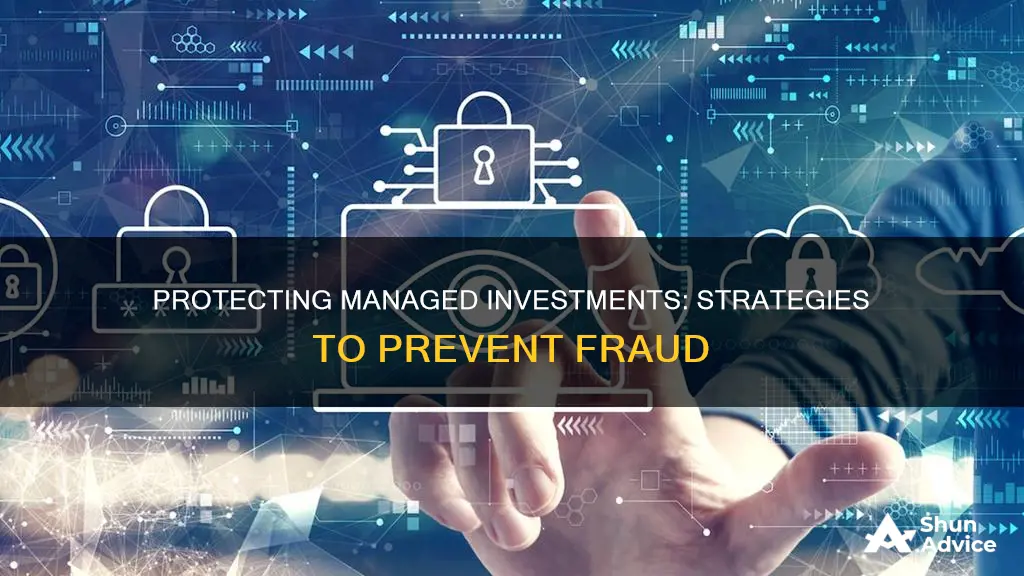
Investment fraud is a costly and pervasive issue, with criminals employing various tactics to deceive investors and manipulate financial markets. To protect your managed investments from fraud, it is essential to be vigilant and proactive. Here are some key strategies to safeguard your investments:
- Research extensively before investing. Do not rely solely on unsolicited emails, message board postings, or company news releases. Understand the company's business, products, and financial statements.
- Be cautious of high-pressure sales tactics and unsolicited offers. Con artists often create a sense of urgency to pressure you into making impulsive decisions.
- Verify the license and registration of the investment firm and the salesperson. Check their disciplinary history and ensure they are licensed to sell securities in your state.
- Be wary of promises that sound too good to be true, such as high returns with minimal risk. Remember, high returns typically entail high risks.
- Consult trusted advisors, such as your financial adviser, lawyer, or accountant, before making any significant investment decisions.
- Protect your personal and financial information online, especially on social media, to prevent falling victim to cyber fraud.
| Characteristics | Values |
|---|---|
| Research | Understand a company's business, products, and services before investing. Look for financial statements, and be wary of unsolicited offers. |
| Ask questions | Do your own digging, and don't rely on the seller for information. |
| Know the salesperson | Check the disciplinary history of brokers and advisors. |
| Be aware of red flags | "Phantom riches", "guaranteed returns", "everyone is buying it", pressure to send money immediately, and reciprocity are all red flags. |
| Protect yourself online | Be cautious of online and social media marketing sites, and secure your social media accounts. |
| Verify | Check the licenses of the person and company involved in the investment. |
| Consult | Speak to a third-party, disinterested person, such as a lawyer or financial advisor. |
What You'll Learn

Research the salesperson and the investment opportunity
Researching the salesperson and the investment opportunity is crucial to protecting your managed investments from fraud. Here are some detailed steps to help you conduct thorough research:
Research the salesperson:
- Verify their license and registration: Check if the salesperson is licensed to sell securities in your state or jurisdiction. In the US, you can use the SEC's and FINRA's online databases to check the disciplinary history of brokers and advisors for free.
- Check their disciplinary history: Look into any run-ins they may have had with regulators or other investors. Your state securities regulator may have additional information on any complaints or disciplinary action taken against them.
- Be cautious of unsolicited offers: Be wary if you receive an offer out of the blue or see an investment opportunity praised online. Always treat unsolicited communication with caution and independently verify the information provided.
- Understand their qualifications: Don't be blinded by the "halo effect", where a salesperson may come across as likeable or trustworthy. Instead, dig deeper into their actual qualifications and experience in the industry.
Research the investment opportunity:
- Understand the company's business: Before investing, take the time to understand the company's products, services, and overall business model. Look for financial statements and other public disclosures to assess their financial health and stability.
- Verify the investment's registration: Depending on your location, investment opportunities are often required to be registered with a regulatory body. For example, in Washington State, most investment products must be registered with the Washington State Department of Financial Institutions (DFI).
- Be wary of high-pressure sales tactics: If someone pressures you to act fast or claims that an opportunity is limited, it's a red flag. Legitimate investments should allow you enough time to make an informed decision.
- Ask for written information: Request a prospectus or offering circular. Even if they claim it's not necessary, don't invest without written material about the company and the investment.
- Consult with trusted advisers: Discuss the investment opportunity with your lawyer, financial advisor, or accountant. They can provide valuable insights and help you assess the risks involved.
- Do your homework: Conduct your own independent research. Look beyond attractive websites or marketing materials. Research the company's finances, operations, and reputation using reliable sources and databases.
Asset Management: Feeding Investment Strategies for Success
You may want to see also

Be wary of unsolicited offers
Unsolicited offers are a common way for scammers to target victims. These offers are generally unsolicited, and fraudsters will often use telephone, email, or in-person means to contact potential victims. If you receive a call out of the blue offering an amazing investment opportunity, be very cautious as this could be a warning sign of a scam. Always treat unsolicited phone calls with skepticism.
Be especially careful if you receive an unsolicited pitch to invest in a company but can't find current financial information about it from independent sources. It could be a "pump and dump" scheme, where scammers artificially drive up the price of a stock, sell their shares for a profit, and leave other investors with losses when the stock price crashes.
Fraudsters may also impersonate representatives of financial associations and regulatory agencies to create a false sense of security about an investment. They may even ask for advanced fees or "taxes" and "processing fees" to participate in a particular investment opportunity. Be wary if someone recommends foreign or "off-shore" investments. It is harder to find out what happened to your money and locate funds sent abroad if something goes wrong.
To protect yourself from unsolicited offers, never invest in something until you have received written material about the company and the investment and have done your independent research. Check out the person touting the investment before you invest. Find out whether securities salespeople are licensed to sell securities in your state and whether they or their firms have had issues with regulators or other investors.
Rajiv Gandhi Equity Savings Scheme: A Smart Investment Move
You may want to see also

Understand different types of fraud
Investment fraud comes in many forms, and it is important to be aware of the different types of fraud to protect your managed investments. Here are some common types of investment fraud:
Ponzi/Pyramid Schemes
Named after Charles Ponzi, who, in the 1920s, defrauded scores of Americans by using new investors' money to pay off existing investors, Ponzi schemes are a type of fraudulent investment where earlier investors are repaid through funds deposited by subsequent investors. The underlying investment claims are usually fictional, and there are rarely any physical assets or genuine investments. Pyramid schemes are a type of multi-level marketing strategy, which is fraudulent when there is no genuine underlying investment enterprise or product.
Promissory Note Schemes
Promissory notes are written promises to pay a specified sum of money at a future date or upon demand, often paying interest. While they can be legitimate, state securities regulators have identified a high number of promissory note frauds, especially those with durations of nine months or less, as they do not require federal or state securities registration.
High-Yield Investment Programs (HYIPs)
These are fraudulent investments that offer extremely high rates of return. The higher the return, the higher the risk, and there is no such thing as a risk-free investment.
Offshore Investment Schemes
Offshore investments are often recommended by scammers because they make it more difficult to regulate the fraud and recover investors' funds. It is also harder to find out what happened to the money and locate the funds if something goes wrong.
Binary Options Schemes
Binary options are a type of wager where investors bet on the performance of an underlying asset, usually within a short period. Fraudsters use high-pressure sales tactics and cold-calling to persuade potential investors to buy.
Crypto Asset-Related Scams
The popularity and complexity of cryptocurrencies and crypto assets make it easy for fraudsters to lure investors into scams. These scams may be Ponzi schemes or other types of fraud, and it is easier for promoters to take advantage of investors due to the lack of a clear regulatory framework.
Social Media/Internet Investment Fraud
Fraudsters use social media and the internet to connect with potential victims, build trust, and promote their schemes. They may join online communities to gain credibility and access potential victims' personal information, making it easier to target them with skillful and highly targeted pitches.
Maximizing Cash Savings: Best Investment Options for You
You may want to see also

Verify the license of the person selling the investment
Unlicensed individuals commit a large portion of investment fraud in the United States. Therefore, it is crucial to always verify the license of the person selling the investment. Here are some steps you can take to do so:
- Check their background: Conduct an online search of the financial professional's name. You can use the Investor Adviser Public Disclosure (IAPD) website, which provides information on whether an investment professional and their firm are licensed with the SEC, state(s), or the Financial Industry Regulatory Authority (FINRA). The IAPD also discloses any disciplinary history.
- Utilize BrokerCheck: The Financial Industry Regulatory Authority's BrokerCheck is a comprehensive database that includes licensing and registration information for registered representatives, securities dealers, and brokerage firms. It covers employment history, disciplinary actions, professional designations, civil judgments, and more.
- Contact relevant authorities: If you cannot find the person or firm on the IAPD or BrokerCheck, you can contact the relevant regulatory bodies directly. For example, in Washington State, you can verify the license of individuals selling investments by calling the Washington State Department of Financial Institutions (DFI) at 360-902-8760 or 1-877-RING DFI (1-877-746-4334).
- Understand the regulatory landscape: It is important to know which regulatory bodies oversee the financial industry in your state or country. In the United States, for instance, the SEC, FINRA, and state securities regulators play a crucial role in licensing and regulating investment professionals. Understanding this landscape will help you navigate the process of verifying licenses effectively.
- Be cautious of unsolicited offers: Always be cautious when receiving unsolicited investment offers, especially through phone calls or emails. Fraudsters may pose as licensed professionals, so it is essential to independently verify their credentials through official channels, as mentioned above.
By taking these steps, you can significantly reduce the risk of falling victim to investment fraud by ensuring that the person selling the investment is duly licensed and authorized to operate in your jurisdiction.
Emergency Savings: Invest or Keep?
You may want to see also

Be cautious of high-pressure sales tactics
When it comes to managing your investments, it's important to be cautious of high-pressure sales tactics. Here are some detailed guidelines to protect yourself:
Be wary of unsolicited offers: Treat unsolicited phone calls, emails, or messages with caution. Fraudsters often use high-pressure tactics to create a sense of urgency, pressuring you to make quick decisions without doing your research. Take your time and independently verify any investment opportunity presented to you.
Verify the salesperson's license: Before considering any investment, spend time checking the credentials of the person promoting it. Verify their license to sell securities in your state or jurisdiction. Contact the relevant regulatory bodies, such as the Securities and Exchange Commission (SEC), to check their disciplinary history and ensure they are authorized to sell investments.
Ask questions and do your research: Don't rely solely on the information provided by the salesperson. Ask questions about the investment opportunity and seek out independent sources of information. Understand the company's business, its products or services, and its financial health before investing. Look for financial statements and research the company beyond the information provided by the salesperson.
Be cautious of extravagant claims: If an investment opportunity sounds too good to be true, it probably is. Be wary of claims like "incredible gains," "breakout stock picks," or "guaranteed high returns with minimal risk." These are often red flags that indicate extremely high risks or outright fraud. Remember, every investment carries some degree of risk, and high returns typically entail high risks.
Seek advice from trusted advisers: Consult your lawyer, financial adviser, or a reputable consultant before making any investment decisions. Discuss the opportunity with them and benefit from their expertise and perspective. Their advice can help you identify potential risks or red flags that you may have otherwise overlooked.
By following these guidelines, you can protect yourself from falling victim to high-pressure sales tactics and make more informed decisions when managing your investments. Remember, it's always better to be cautious and thorough when it comes to your financial well-being.
Portfolio Investing: A Smart Approach for Wise Investors
You may want to see also
Frequently asked questions
If it sounds too good to be true, it probably is. Be wary of investments that promise high returns with little or no risk, and always do your own independent research.
Be suspicious of unsolicited offers, high-pressure sales tactics, and requests for personal information.
Ask questions and do your research before investing. Understand the company's business and its products or services, and check the background of the person selling the investment.







